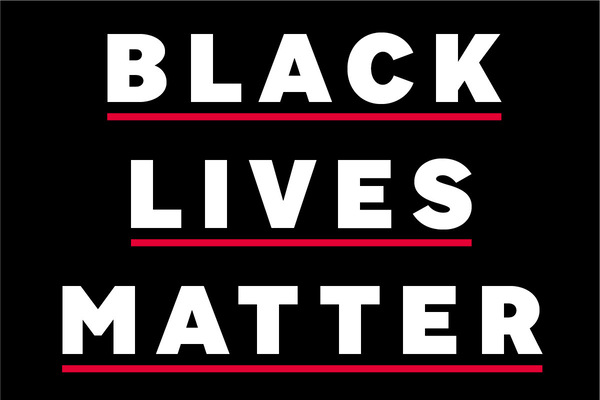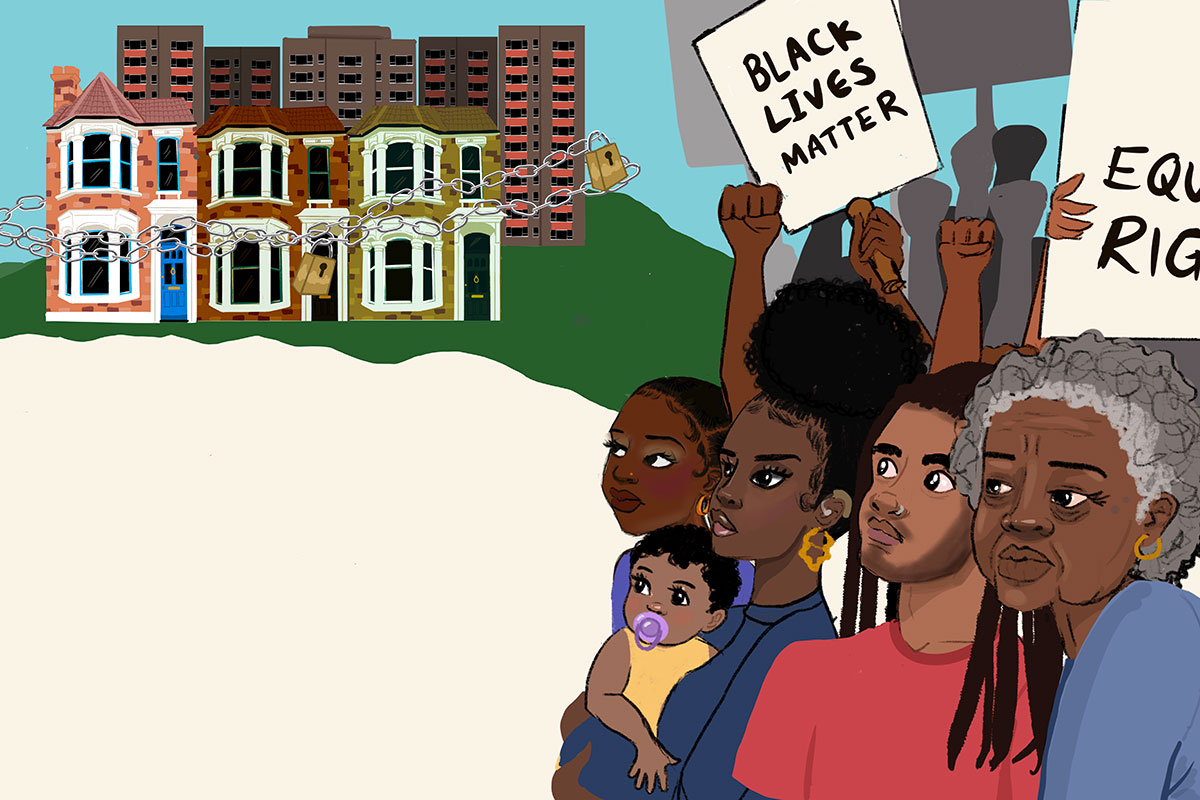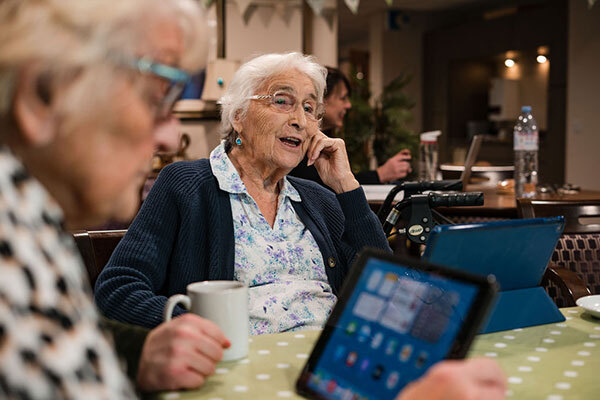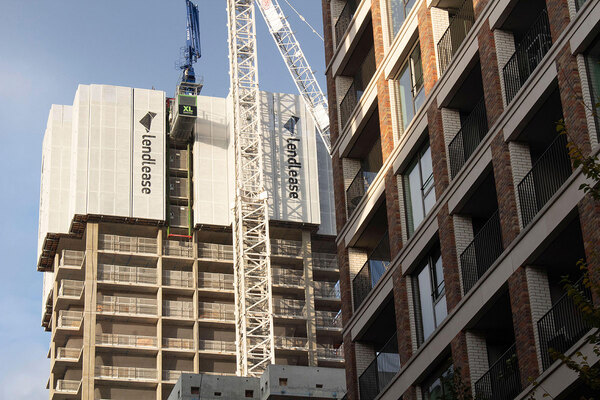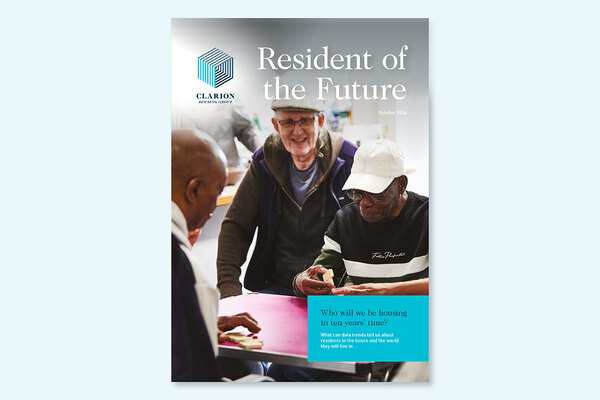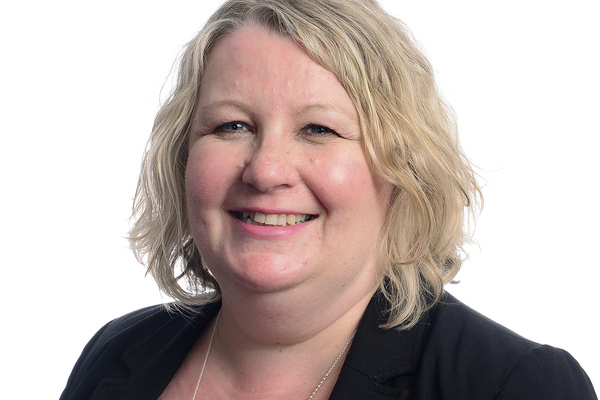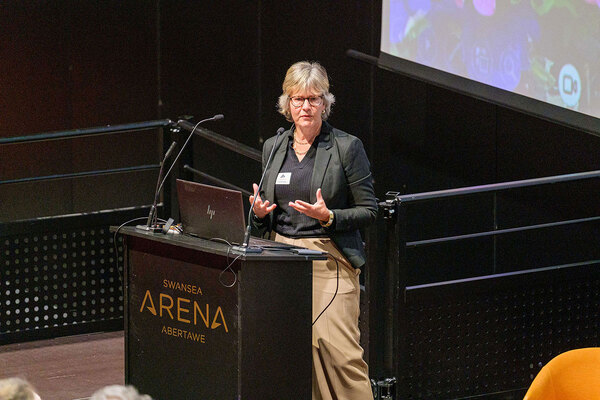Black Lives Matter: what did housing associations do next?
In 2021, Inside Housing asked housing associations what they were doing to address race inequity. This month, we go back to the landlords that responded to find out what has changed as a result of those actions. Jess McCabe reports. Illustration by Raj Dhunna
Black Lives Matter might have started in response to police violence against Black people in the United States, but the ramifications swept across the globe. That included social landlords in the UK.
Many landlords put out statements at the time, committing to anti-racism. In 2021, Inside Housing surveyed housing associations because we wanted to find out what specific changes they were making to address race inequity. Twenty-three responded, which produced an extensive list of these promises, plans and pledges.
A number set up formal listening processes, with the aim being to find out more about what it was like for Black, Asian and minority ethnic staff to work for them. A handful promised to publish their ethnicity pay gap – showing if there was a difference in what Black, Asian and minority ethnic staff members were paid, compared to white staff members.
Housing 21 introduced a target of building at least 10% of new homes in areas where the Black, Asian and ethnic minority population was at least 30%.
But having a policy is one thing. Implementing it is another. And being able to evidence some kind of positive, anti-racist change? That is another again.
We wanted to find out the impact of those plans. Inside Housing wrote back to all 23 of the landlords that answered our original survey, to ask them: what happened next? Did those pledges made in the height of the Black Lives Matter movement actually get implemented? And if they did, what changed? How did plans evolve as organisations learned more?
Some areas proved much easier than others to measure. Targets relating to the diversity of people holding senior roles and the ethnicity pay gap was one such area.
Vivid tells Inside Housing that its median ethnicity pay gap has closed from 11.8% in 2019 to 4.7%, although its reporting shows that its median gap had reduced to 1.8% in 2020. Vivid said in our original survey that it was planning but had not yet implemented recruitment targets to ensure the workforce matched the demographic. “In 2020, we had four new starters who classified themselves as non-white, compared to 13 in 2022,” Vivid says, adding that “an average of 3.9% of our employees describe their ethnicity as non-white, compared to 6.5% in the local community”.
The path to pay gap reporting does not always run smoothly, though. Housing 21 says that annual ethnicity pay gap calculations are reported to the executive team and board. “The report identified, at a top level, that non-white employees were paid more than white employees. On further investigation, we discovered this was due to a number of employees not sharing their data,” a spokesperson says. It is now “refreshing” its data on employees as a result.
On representation at senior levels, Anchor was one of the landlords able to provide data. It says that 14% of the retirement specialist’s staff identify as minority ethnic on its staff survey. “In 2022, the number of colleagues from a diverse ethnic background in leadership roles at Anchor increased from 3.9% to 9.4%,” Anchor says.
Hyde carried out its first diversity and inclusion survey in the wake of BLM. This found that ethnic minority staff make up 30% of its workforce, compared to 11.7% of its senior leaders. Hyde has now set targets to increase diversity of senior roles, although it did not spell out what those targets are, and had not replied to Inside Housing’s questions asking for more details by press time.
Its diversity survey in 2022 found that three in four staff thought Hyde was doing a good job on diversity and inclusion. “The survey also told us that 8% of our staff had experienced discrimination – mainly from a colleague – while 6% said they weren’t sure that reported discrimination was dealt with correctly,” the landlord says. “We’ve since updated our intranet to explain to staff how they can report discrimination and the steps we take when investigating reports.”
Hyde ran another survey in the first weeks of 2023, and says it is still analysing the results.
Rooney Rule
Many organisations adopted the Rooney Rule for the recruitment of senior posts – whereby the interview list must include a person of colour.
This includes EMH Group, although the association says: “We did adopt the Rooney Rule and we continue to apply this. However, the issue is how to attract a diverse range of candidates. We have reviewed our recruitment practices and made changes, and the review is continuing as we introduced an electronic recruitment system.”
Peabody also adopted the Rooney Rule. The London landlord says: “A number of ethnic minority candidates have been appointed in this way. In terms of the impact on the ethnic minority representation of the senior management team (heads of service and above), this has so far remained fairly static. This is due in part to the low level of turnover at heads of service level and above, and the small number of senior vacancies we have.”
Then you have Housing 21’s pledge, which is mentioned above. At the time of the survey, Housing 21 was planning to build at least 800 homes and said that at least 10% would be in areas where at least 30% of the population was from a Black, Asian or minority ethnic background. The association has since slashed its new homes target in response to the economic situation, to 400 homes a year.
Housing 21 says: “We believe now is a good time to acquire specialist older persons’ housing from other registered providers, who may want to focus on their core general needs provision. Consequently, we anticipate acquiring circa 470 homes in 2023 and up to 500 in 2024. Acquisitions being considered are in areas where at least 30% of the population is from a Black, Asian and minority ethnic background, so we anticipate achieving our target.”
Unconscious bias training, and other diversity training
“Nonsense” – this is the word that Colin Prescod recently used to describe unconscious bias training, as he left
his role as chair of the Institute of Race Relations. “It’s systemic behaviour we want to talk about, institutionalised racism we want to talk about, not unconscious bias or racial awareness.”
In 2020, the government announced it was phasing this training out in the civil service and MP Julia Lopez said: “We encourage other public sector employers to do likewise.”
Debates continue on how useful this type of training is, and whether it is necessary– Frederick Herbert, writing for the London School of Economics, described it as “a seed or foundation upon which other interventions can build”.
Regardless of these debates, plenty of social landlords told us in 2021 that they planned to use this training, or were already doing so.
Optivo (before its December 2022 merger with Southern) told Inside Housing it had made unconscious bias training open to all staff.
Asked for an update on how this went, Southern says that by October 2021, 80% of all Optivo colleagues had been trained in “some form of EDI learning”. All “non-people managers” had unconscious bias training, including two hours of live training and post-course reading.
Another version of the training was offered to managers, with a “focus on the employee lifecycle, from talent attraction and recruitment through to development and support of individuals”.
Although Inside Housing did ask about the impact of the training, Southern did not answer this question.
EMH also has unconscious bias training as part of its mandatory training programme. “It has certainly raised awareness from conversations with colleagues. However, it is difficult to measure the impact,” the 21,000-home landlord says. In 2022, it also started a workshop for all managers and supervisors on “creating diverse leaders”.
EMH says: “This was piloted in 2022 and will build on the unconscious bias training by helping managers to understand their role in creating a truly diverse and inclusive workplace. The workshop will be followed up with sessions with all the senior leadership teams across EMH, looking at our EDI data and what further actions each senior management team can take.”
Leeds & Yorkshire Housing Association was able to give Inside Housing some data on the impact of its training on allyship. At the start of the session, most attendees (76%) were not sure they understood the role and responsibilities of an effective ally. By the end of the session, 81% said they were ‘pretty confident’ and 14% said they were ‘very confident’.
“We are also working on delivering our first cohousing scheme in Lozells, Birmingham, which has a high Black, Asian and minority ethnic population,” Housing 21 adds.
Mergers had an impact on some schemes, as merged organisations either adopted or dropped plans from the original business. For example, Central & Cecil was one of the original responders. It told Inside Housing in 2021 that it had a particular focus on care home staff – building relationships with London colleagues, with the aim of attracting male and ethnic minority staff to positions given the “disproportionately large numbers of female workers in this area”.
Central & Cecil merged with Aster in October 2021. Aster sent Inside Housing detailed information about its own strategies, including redacted CVs, and “a review of our routes to market exploring how we can use our partnership to access a more diverse range of job boards”. But when asked about Central & Cecil’s targeted care recruitment plan, Aster says: “All actions (above) being introduced at Aster will apply for Central & Cecil.”
One initiative has a significant evidence base – for 18 months ending in January 2021, Manchester housing associations participated in a formal “reciprocal mentoring” programme designed by researchers at Manchester Metropolitan University. Black, Asian and minority ethnic mentees were partnered with senior mentors – most of them white – working for the external Greater Manchester Housing Providers.
Abri’s story
Number of homes: 35,000
Location: South West
In 2021, Abri was working on a “plan to create real and sustainable cultural change now and in the future”, including “but not limited” to specific pledges.
The pledge: A new equality, diversity and inclusion (EDI) training offer to all colleagues.
The update: “All Abri colleagues have to complete annual e-learning on EDI and directorates can request specific EDI learning – we’ve delivered to the development team and governance team so far. We’re also rolling out everyday inclusion and respect training to our trades,” says Abri.
The pledge: Mainstreaming of EDI into decision-making.
The update: “Equality impact assessments are carried out when we change any of our processes or procedures, so we can understand the impact and make any changes required,” says Abri.
Examples given by Abri do not relate directly to race equity, but do show the influence this strategy can have. The refurbishment of Abri’s headquarters, Collins House, included updated assisted listening technology in the boardroom and “superloos” that include all services within the loo, meaning they can be gender neutral.
The pledge: A new EDI committee set up to agree actions and next steps for the organisation.
The update: Abri has two EDI committees, one of which is a steering group of senior colleagues including the CEO.
The pledge: Data collection project involving customers and staff.
The update: In March 2021, Abri had a month-long drive to collect staff demographic data, supported by FAQs on why to share the data, and blogs from staff who had already done so. This culminated in a “census day” at the end of March, which has been turned into an annual event. Abri also noticed that not many trades or independent living scheme staff were sharing data, so made tablets available.
“We have used this to measure pay gaps (gender and ethnicity) and to look at areas of under-representation at all levels. We also use this information to inform our equality impact assessments, especially ones that are related to reorganisations or restructures,” says Abri.
Its customer data project started in July 2021, using a third party to begin collecting baseline data. Abri has also updated its forms for lettings, new occupants and development, to try to collect this data. Abri says it has further to go in this area.
“At the start of the project, Abri knew a lot less about whether certain groups (protected characteristics) were accessing services that would help them and how any decision Abri makes can impact them. Collecting more diversity data enables Abri to identify areas where customers are potentially being underserved by the organisation,” the landlord says.
“We believe that when senior leaders mentor up-and-coming BAME [Black, Asian and minority ethnic] employees, they become much more aware of the additional challenges BAME employees face in developing their careers,” the researchers said in a report on the pilot.
For the mentees, the report said: “The mentor provided advocacy and guidance to support the mentee’s career development, a vital resource for BAME staff whom – evidence tells us – often miss out on more informal career mentoring. Two mentees are now further along in their leadership careers as a direct result of experiencing this pilot programme.”
That programme has ended, but it has now been replaced by a new programme, called BOOST. First Choice Homes Oldham, which wasn’t able to give much detail about its plans at the time of our original survey, has since joined the programme.
Sovereign’s story
Number of homes: 61,216
Location: South of England
The pledge: In 2021, Sovereign told us that it had developed a Race Action Plan, setting out the actions and outcomes over the next 12 months.
The update: Inside Housing asked for details on what the Race Action Plan contained, what it achieved and the outcomes. Sovereign didn’t respond on these points, but says: “Since developing this, we have put in place a number of initiatives to help us build on this plan. Some of the actions focus on EDI more widely, others are targeted specifically at race and ethnicity.”
The pledge: At the time of the original survey, Sovereign was planning to publish an EDI strategy.
The update: “In June 2020, we began to develop a new EDI strategy, with the ambition that Sovereign should show leadership in EDI. Centred around the four themes of leadership, representation, plus employee and customer inclusion, it sets out our priorities over this period and where we most want to see change. We have achieved many of the ambitions in our existing strategy. This includes improving the data we hold, increasing our learning interventions on EDI and making sure our talent acquisition strategy encourages applications from all underrepresented groups.”
The pledge: At the time of our original survey, Tracey Barnes, then chief financial officer, was the executive board sponsor for Race, meeting Caribbean, African and Asian Network members monthly. We asked who had replaced Ms Barnes, who stepped down in November last year, and if these meetings were still ongoing.
The update: “We are looking to appoint a new sponsor following our next EDI forum, which is taking place shortly. We’re also in the process of appointing our next EDI lead,” Sovereign says.
The pledge: At the time of the original survey, Sovereign had commissioned specialist unconscious bias training.
The update: “This went ahead and was delivered to hiring managers and those in our customer directorate. Training was also delivered to our talent acquisition team and executive board. While we found this unconscious bias training useful, we do believe that culture change is the most important factor, which is why we have focused more of our efforts on this.”
Vivid’s story
Number of homes: 33,355
Location: South of England
The pledge: At the time of the original survey, Vivid had published an ethnicity pay gap report showing the gap had been cut to only 1.8%.
The update: Vivid had cut its ethnicity pay gap from 11.8% to 1.8% in 2021, but it has since gone up to 4.7% – although still seven percentage points down from its 2019 figure. “Given the small percentage of people we have from a non-white background, the number will always be variable at any given time, but we’re pleased that the trend since VIVID was formed means the pay gap is overall going downwards,” Vivid tells us. The association has continued to publish this data, which in 2022 also showed “3.9% of our employees describe their ethnicity as non-white, compared to 6.5% in the local community”.
The pledge: In 2021, Vivid described a number of initiatives to improve recruitment pathways and encourage more applications by diverse applicants, including using different job boards, and training recruiting managers in unconscious bias.
The update: Vivid says it has gone further on this journey. “We’re now interviewing everyone from under-represented groups if they meet the essential criteria for the role and are much more proactively advertising our roles on a variety of different websites to attract a more diverse range of applicants,” the landlord tells Inside Housing. Vivid says it continues to run unconscious bias training for senior leadership and managers, and has an e-learning module on equality and diversity available to everyone – and mandatory for new joiners to the business.
The pledge: In 2021, Vivid planned to introduce anonymised CVs.
The update: “We explored this with the provider of our recruitment system and unfortunately it can’t accommodate blind CVs,” Vivid says. “We have introduced other methods to make sure we attract and have an inclusive approach to recruitment.”
The pledge: Vivid signed the Business in the Community Race at Work charter.
The update: Vivid gave a very detailed breakdown of what being a signatory involves, including appointing an executive sponsor for race – in this case group director of resources Duncan Short, capturing ethnicity data on staff – Vivid says 81.5% of employees have provided this. This has also led to a board-level commitment to zero tolerance on harassment and bullying.
In numbers
3 in 4
Employees at Hyde who said it was doing a good job on diversity and inclusion, according to a 2022 survey
80%
Optivo staff who’d had EDI training by October 2021
81%
Leeds & Yorkshire staff members who were ‘pretty confident’ in understanding their role as an ally after training, with 14% ‘very confident’
“Colleagues from an ethnic minority background are mentored by a senior leader from a white British background from a different organisation. Being involved in this programme is helping us understand the barriers to career progression for colleagues from minority ethnic backgrounds, it supports members of our team to develop in their roles and it creates a more empowering and diverse leadership environment at First Choice Homes Oldham,” explains Sarah Costigan, its director of people and culture.
Mohammed Yasser, head of legal services at First Choice Homes Oldham, is one staff member who has completed mentoring on the programme. He says: “The reverse mentoring helped executive colleagues to see the things that can hold back individuals from ethnic minority backgrounds, instead of telling us these are the obstacles that you have to overcome.”
There were a small number of the associations that did not respond to our follow-up story. Soha Housing, at the time of our original survey, told us: “We don’t think we yet have a strong enough story to tell on BLM, but we are working on this and hope this year we will have a strong BAME group and initiatives.”
In an update this month, Soha says: “We’ve not made further progress with plans as yet. However, it continues to be in our sight following internal reorganisation to enable even more focus on our local communities.”
Others were able to tell a more detailed story on their efforts, and in many cases could provide data on the material impacts these strategies have had. While being anti-racist might seem like a huge task, we can see from these stories that it is possible to take action. And action can lead to very real results.
What do Black, Asian and ethnic minority staff think?
“The organisation says the right thing, but is light on real sustainable action to deliver change.”
So said one of the respondents to Inside Housing’s survey of Black, Asian and minority ethnic staff working in housing.
As we were preparing this story on what organisations were doing on actions to address racism after Black Lives Matter, we wanted to include the voices of staff of colour in the sector – because they were best placed to know what was really occurring.
To this end, we opened a survey and asked Black, Asian and ethnic minority people who work in housing to respond. A total of 83 people filled in our survey – we must note they work in organisations across the sector, not just for the housing associations included in our survey. But what did they say?
A proportion of 40% worked at organisations that made specific pledges in the wake of BLM. Even though many were disheartened at the depth of action on these pledges, many of those who worked in organisations where no pledges had been made expressed disappointment at the lost opportunity to do something.
“It’s a long-standing issue and would have been the perfect opportunity for them to engage,” said one respondent, who identified as a Black woman.
“I’ve thankfully moved and now work for an organisation with a far stronger and more robust approach to EDI and BLM,” said another.
Perhaps more worryingly, only 27% of the housing professionals who filled in the survey feel that their organisation’s approach to race has improved since BLM. While some respondents said this was because there was no need to change because their organisation was already doing well, others told a different story. One respondent told us that, after BLM, the situation at work got worse, with other staff making negative comments that are “much more open now”, and even leaving racist ‘jokes’ about the BLM movement in the work environment.
A total of 43% of respondents said they had personally experienced racist incidents at work. We asked what the response was like by the organisation if these incidents had been reported. Some of the answers to this question show how far the sector still has to go. “Did not investigate the reports and did not discipline the employee,” said one respondent. “It wasn’t really addressed – [my] senior manager almost expected to put up with more,” said another. Another said the response was inadequate, as the incident “was dealt with by a conversation with the individual, even though the incident was witnessed by senior managers”.
There is not room here to include all the cases, but the findings strongly echo the stories shared with Inside Housing during our previous investigations in 2018 and 2020 into discrimination occurring in the housing sector.
The results show the journey the sector still has to travel if it is to ensure that the talents of Black, Asian and minority ethnic staff are recognised, let alone the aim expressed by some of becoming anti-racist.
Leeds & Yorkshire Housing Association’s story
Number of homes: 1,678
Location: Yorkshire
The pledge: Leeds & Yorkshire Housing Association (LYHA) was working on an annual action plan with the Housing Diversity Network (HDN).
The update: After working with HDN, involved customers and colleagues, LYHA launched a three-year EDI strategy and supporting action plan in March 2021. The landlord is two years in, and listed a number of achievements from this plan. This resulted in one of the most thorough responses to Inside Housing’s survey of any landlord, and it is only possible to mention a few of the initiatives described.
LYHA mentioned learning events around EDI topics, including a talk on Islamophobia and a talk on social inclusion for older LGBTQ+ people. An external organisation called Tell Jane was commissioned to run a programme of awareness-raising sessions on various topics to support staff in their jobs, including on allyship, fostering inequality and “how to be anti-racist”.
A talk on neurodiversity in the workplace led LYHA to set up a neurodiversity support bath for staff.
On recruitment, LYHA provided a thorough explanation of its new processes, which include running job ads through a “gender decoder” to ensure language isn’t discriminatory, and states “candidates are always asked a question on EDI which is tailored to the role they have applied for”. LYHA now gives interviewees copies of the interview questions ahead of time.
LYHA listed a number of actions it is still working on, including implementing equality impact assessments and a review of the website.
LYHA has now merged with York Housing to become 54North Homes. It says: “The year three action plan now needs to be reviewed” in light of the merger.
Sign up for the IH long read bulletin
Already have an account? Click here to manage your newsletters

